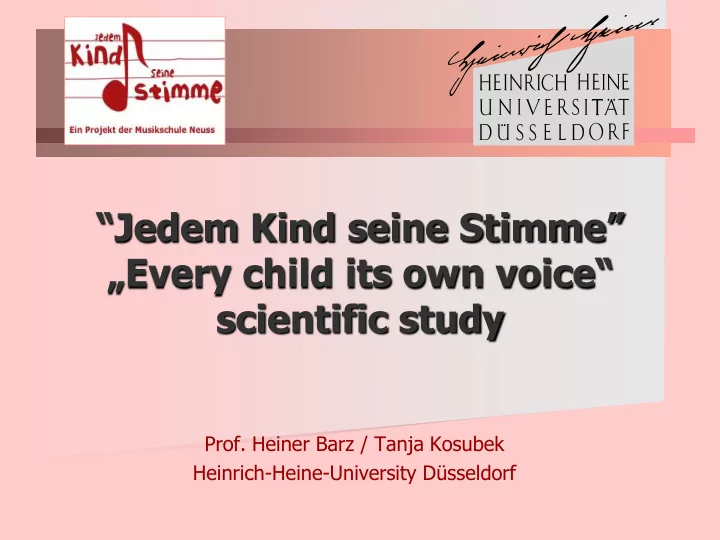

“Jedem Kind seine Stimme” „Every child its own voice“ scientific study Prof. Heiner Barz / Tanja Kosubek Heinrich-Heine-University Düsseldorf
Who's doing the research? Professor Dr. Heiner Barz / Tanja Kosubek Department of Educational Research and Educational Management, Heinrich-Heine-Universität Düsseldorf Research focus a.o.: - Cultural education - Evaluation of cultural and artistic projects in schools, e.g. „Take - off: junger Tanz“ (dance education in schools) Prof. Heiner Barz / Tanja Kosubek Evaluation: JeKiSti 10.03.2010
What's NOT being researched? There are many difficulties to get reliable research results about the interrelation of making music and cognitive skills. In this study we don’t want to legitimate music education with the argument of possible improvements of cognitive skills. Prof. Heiner Barz / Tanja Kosubek Evaluation: JeKiSti 10.03.2010
What's being researched? Evaluation design Acceptance & Results of Gender/ Pedagogical Quality of Commitment Music Inter- Results Cooperation/ Education culturalism Tandem- teaching Interviews children, teachers, singing teachers, project team Questionnaires teachers, singing teachers, parents Audio diaries children Group Discussions singing teachers teachers Prof. Heiner Barz / Tanja Kosubek Evaluation: JeKiSti 10.03.2010
1 st Results: Children's comments What about the project? „ The project is great because I do enjoy singing with other kids.“ (f) „Well I guess the project is thought as recuperation from all the thinking. “ (m) „Somehow I have become nicer .“ (m) „Sometimes I'm sleepy in the morning. But now when there is so much movement in the singing lessons, I'm just fitter and better able to perform all other tasks. “ (f) Prof. Heiner Barz / Tanja Kosubek Evaluation: JeKiSti 10.03.2010
1 st results: Parents & school teachers Project acceptance 100% 90% 80% 70% 60% parents 50% teachers 40% 30% 20% 10% N = 92 0% JeKiSti intensifies JeKiSti boosts the musical lessons are parents' commitment to school image part of basical their children's school education Prof. Heiner Barz / Tanja Kosubek Evaluation: JeKiSti 10.03.2010
1 st results: Parents & school teachers Who should teach music? 100% 90% 80% 70% 60% parents 50% teachers 40% 30% 20% 10% N = 92 0% teachers can give good musical lessons at school music lessons even without ought to be given by the support of professional singing professionals teachers Prof. Heiner Barz / Tanja Kosubek Evaluation: JeKiSti 10.03.2010
1 st results: Parents Music: End in itself or means to an end? Which statement do you agree with? Parents school 1 Person B: Person A: „By means of music and „Music and arts should singing children are 77% 23% not be judged on their enabled to practice utility for employment. concentration and Schools should offer discipline. That’s why artistic education to all Parents school 2 we need artistic pupils – just because education in schools: music and arts are part Children get a benefit of life.“ for other school subjects 54% 46% and later employments.“ N = 92 Prof. Heiner Barz / Tanja Kosubek Evaluation: JeKiSti 10.03.2010
1 st results: Parents Children’s leisure activities 100% 90% school 1 80% 70% school 2 60% school 1 school 1 50% school 2 40% 30% 20% school 1 school 2 10% school 2 0% sports instruments singing N = 63 (multiple answers permitted) Prof. Heiner Barz / Tanja Kosubek Evaluation: JeKiSti 10.03.2010
1 st results: Parents Commitment „I want my child to get singing lessons from the JeKiSti project next school year also. The JeKiSti project shall be continued in my child’s class.” School 1: affirmation („yes“ or „rather yes“) 100 % School 2: affirmation („yes“ or „rather yes“) 97% N = 63 In families coming from deprived social milieus without own musical backgrounds the project idea is accepted and highly estimated. The project can be considered as an important contribution to equal opportunities in the field of arts and culture. Prof. Heiner Barz / Tanja Kosubek Evaluation: JeKiSti 10.03.2010
Thank you for your attention Prof. Heiner Barz / Tanja Kosubek Evaluation: JeKiSti 10.03.2010
Recommend
More recommend